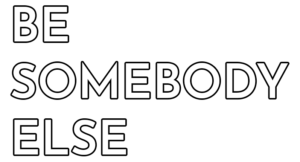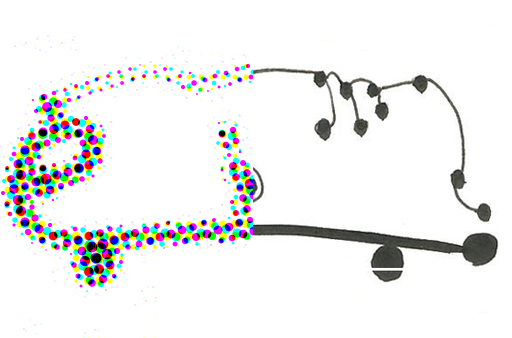
HELPLESSNESS / RAGE
I’m used to hearing people say: ‘the common denominator is me’. It’s often a relief to hear someone accept that they may be the source of a problem, that they realise they may be doing something a lot of the time which makes life hard for them — and for other people. But we don’t only exist like that.
We feel we exist individually and the reality is very different.
If I wake up and think ‘I don’t feel myself today’ I know what I mean. I feel ‘off’, somehow. If I don’t think this kind of thing I’m usually feeling … okay. Good, even. Here’s a thought: we feel ourselves. A scientist might tell you that we feel our way through life before we think about it.
This thing that goes on, this good–self-feeling thing, leaves you feeling you; but it doesn’t tell you how interconnected you are with everything around you. Paul Federn wrote about this way back and anybody who’s ever been into improvisation or poetry, factories for vibes that mean we can all meet up, truly plural vibes, will know exactly what I mean.
When somebody tells me ‘the common denominator is me’ I wonder: do they mean that they are going about instigating some kind of a problem which makes life harder than it has to be? Are they doing things that on reflection they wish they had not done because something else would have been the right thing? Something which wouldn’t hurt them or other people like that?
Or are this person saying ‘the common denominator is me’ hurting differently: refusing to tolerate some of the things that might follow them around from one group of people to the next in a weird kind of a way? I mean things like friendship or family, notions that people inhabit, generally without thinking about it, which dictate how a life needs to be lead. These vibes, these ways of doing life, are alive with people: they come from and through people. If you disagree, life gets tricky.
If you don’t think blood is thicker than water, as they say, or that family always comes first, as I heard someone else say, where does that leave you in situations when your experience of family is bad? Or you don’t think loyalty to your friends should over-ride other people’s peace of mind? Or for that matter when you think anything that seems to clash with the status quo? When you find somebody overlooking you because of the colour of your skin or other ways your body is, or has become, what next?
The common denominator is not only you. You are never alone.
The common denominator is you plus the force and effect of whatever you disagree with, felt in you, messing you up, as administered by other people. Our lives are full of these things. Family and friendship, and you could also think about misogyny, racism, sexuality, cowardice, resilience, or productivity. All of these things interconnect. Nicolas Abraham and probably Maria Torok thought about the dynamics of intersubjective functioning. I’m not into ‘intersubjectivity’ but let’s go with that. Fred Moten thinks about everything, so let’s go with him. These words, these things are bodies of signifiers. They do as much as anything that lives. They are group totals of who we are — the more than me as an individual which can only be felt through its effects.
Why is this important? Because often, if you conclude that you are the common denominator in situations that get fiery, or frightening, or depressing, you can find yourself believing that you must change. People around you might agree with that. Even your family and friends.
There’s a line in life that we can all come to. It marks a division between what you feel is right and true, and what others do. Do you cross it? Maybe if you cross it there’s a vibe that says you’re wrong or crazy, deluded.
Or perhaps you’re in touch with injustice and there’s no arguing with that.
Hold hands with somebody else when you cross that line. Justice may be impossible to achieve, but it’s always there to be found if you look for it together. Thinking like an individual makes you think about yours, which is always going to be a kind of profiteering, which is never just in any sense. Justice never gets started. Thinking together, which can only be felt, which might have good vibes, might find a beginning like this.


